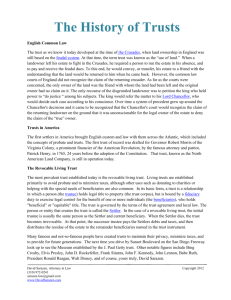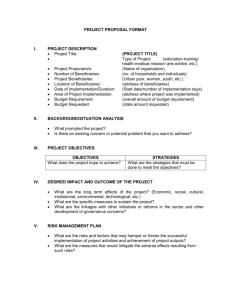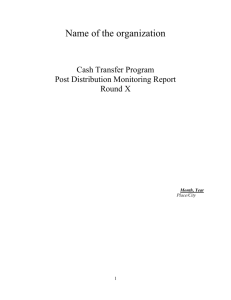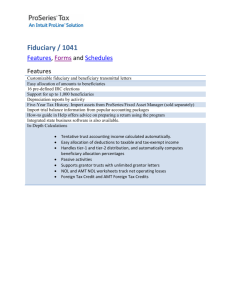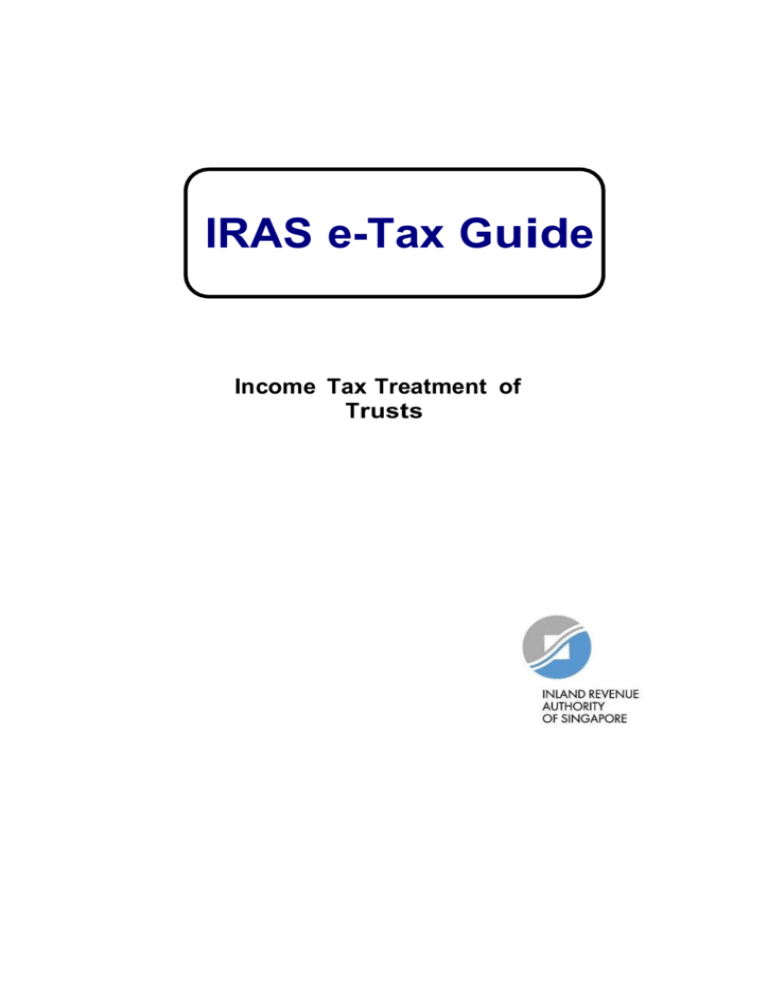
IRAS e-Tax Guide
Income Tax Treatment of
Trusts
Published by
Inland Revenue Authority of Singapore
Published on 8 Oct 2014
Disclaimers: IRAS shall not be responsible or held accountable in any way for any damage, loss or expense
whatsoever, arising directly or indirectly from any inaccuracy or incompleteness in the Contents of this e-Tax
Guide, or errors or omissions in the transmission of the Contents. IRAS shall not be responsible or held
accountable in any way for any decision made or action taken by you or any third party in reliance upon the
Contents in this e-Tax Guide. This information aims to provide a better general understanding of taxpayers’
tax obligations and is not intended to comprehensively address all possible tax issues that may arise. While
every effort has been made to ensure that this information is consistent with existing law and practice, should
there be any changes, IRAS reserves the right to vary our position accordingly.
© Inland Revenue Authority of Singapore
All rights reserved. No part of this publication may be reproduced or transmitted in any form or by any means,
including photocopying and recording without the written permission of the copyright holder, application for
which should be addressed to the publisher. Such written permission must also be obtained before any part
of this publication is stored in a retrieval system of any nature.
Table of Contents
Page
1
Aim ........................................................................................................... 1
2
At a glance……………………………………………………………………... 2
3
Glossary………………………………………………………………………... 3
4
Background............................................................................................. 4
5
Tax Treatment of Trusts......................................................................... 4
6
Contact Information................................................................................ 5
7
Annex 1 – Summary of Income Tax Treatment of Trusts ..................... 6
Income Tax Treatment of Trusts
1
Aim
1.1
This e-Tax guide sets out the income tax treatment of trusts as provided in the
Income Tax Act 1 (“ITA”).
1.2
This e-Tax guide is relevant to you if you are a trustee of a trust, including a
legal personal representative (administrator or executor) of an estate of a
deceased.
1.3
This e-tax guide will not cover the following types of trusts:
(a)
(b)
(c)
(d)
(e)
(f)
(g)
(h)
(i)
(j)
1.4
Real Estate Investment Trusts (“REITs”) 2;
Designated Unit Trusts and CPF Approved Unit Trusts 3;
Approved Unit Trusts 4;
Trust Funds (Foreign Investors) 5;
Foreign Trusts 6;
Philanthropic Purpose Trusts7;
Prescribed Locally Administered Trusts8;
Registered Business Trusts 9.
Income of Non-Resident arising from funds managed by fund manager
in Singapore 10;
Income from funds managed by fund manager in Singapore. 11
The ITA has specific provisions that deal with the tax treatment of the above
trusts. Thus, the tax treatment of these or any other types of trusts which is
specifically provided in the ITA will continue to be governed by the respective
provisions in the ITA and is unaffected by the tax treatment set out in this etax guide.
1
This e-Tax guide replaces the IRAS’s e-Tax guide on “Income Tax Treatment of Trusts” published on
05 Jan 2012.
2
More information on REITs can be found in the e-tax guide on “Income Tax Treatment of Real Estate
Investment Trusts (Second edition)”
3
Section 35(12) & (12A) of ITA.
4
Section 10B of ITA.
5
Section 13C of ITA.
6
Section 13G of ITA.
7
Section 13O of ITA.
8
Section 13Q of ITA (introduced in Income Tax (Amendment) Act 2007).
9
Section 36B of ITA. For tax purposes, registered business trusts are treated like companies. More
information on Registered Business Trusts can be found in the e-tax guide on “Income Tax Treatment of
a Trust Registered under the Business Trusts Act 2004”
10
Section 13CA of ITA.
11
Section 13X of ITA.
1
2
At a glance
2.1 Income derived by trusts will be taxed either at the trustee level or in the hands
of the beneficiaries if they are resident in Singapore and entitled to the trust
income. However, income derived from a trade or business carried on by the
trustee is subject to a final tax at the trustee level.
2.2 Resident beneficiaries will also be accorded the concessions, exemptions and
foreign tax credits as if they had received the trust income directly (sections 13T,
43X and 50B).
2
3
Glossary
3.1
Resident beneficiaries
This refers to beneficiaries of a trust that are resident in Singapore.
3.2
Trustee
An individual or organization which holds and administers properties or assets
through a trust, for the benefits of other persons.
3.3
Foreign tax credit
This refers to a credit for the foreign tax paid on foreign income that is allowed
as an offset against Singapore tax payable on the same income. The credit to
be granted is the lower of the foreign tax paid and Singapore tax payable.
Foreign tax credits are granted only to Singapore tax residents.
3
4
Background
4.1
Section 35(11) of the ITA provides that the income of a trust is the statutory
income of the trustee and is chargeable to tax on the trustee.
4.2 Prior to the Year of Assessment (“YA”) 2008, where a beneficiary is entitled to
the trust income or a share of it, the beneficiary may be taxed on the
entitlement, and allowed a credit for tax already imposed at the trustee level 12.
The Comptroller may also agree not to subject the trustee to tax on the trust
income to which the beneficiary is entitled, but to tax the beneficiary on the
distribution received (also known as the “tax transparent treatment”).
4.3
In addition, distributions received by the beneficiaries of a trust would be treated
as not being of the same nature as the underlying trust income. Hence, any
concessions, exemptions and foreign tax credits that would have been
applicable to the underlying income would not be available to the distributions
received by the beneficiaries.
5
Tax Treatment of Trusts
5.1
With effect from YA 2008 13, the following tax treatment will apply to resident
beneficiaries who are entitled to the trust income:
(a)
The Comptroller will accord the tax transparency treatment under section
43(2). No tax will be imposed at the trustee level and the beneficiaries
are subject to tax on their entitlement to the share of trust income.
(b)
The beneficiaries will be accorded the concessions, exemptions and
foreign tax credits as if they had received the trust income directly
(sections 13T, 43X and 50B). In other words, distributions received by
such beneficiaries are deemed to have retained the nature of the
underlying trust income for the purpose of claiming the concessions,
exemptions and foreign tax credits by the beneficiaries.
5.2
Whether or not a beneficiary is entitled to the trust income is a question of
fact. One would have to examine the trust deed to determine if the
beneficiaries of the trust are indeed entitled to the trust income. However,
where the trust income is distributed to the beneficiaries within the same
year in which the trust income is derived, the Comptroller will treat the
beneficiaries as being entitled to income distributed.
5.3
The treatment set out in paragraph 5.1 shall not apply to the following:
(a)
(b)
Income derived from a trade or business carried on by the trustee
(sections 43(2A)(c) and 35(16)(c));
Trust income to which the beneficiaries are not entitled; and
12
Section 46(1)(b)(ii) of ITA (before the changes made in the Income Tax (Amendment) Act 2007).
The changes relating to trusts were included in the Income Tax (Amendment) Act 2007 which was
passed by Parliament on 22 January 2007.
13
4
(c)
Trust income to which non-resident beneficiaries are entitled.
5.4
The trust income in paragraph 5.3 is subject to a final tax at the trustee level.
Distributions made out of such income are capital in nature and therefore will
not be subject to any further tax in the hands of the beneficiaries.
5.5
The combined effect of tax treatments set out in the preceding paragraphs
means that there will not be a case where tax is imposed on trust income, once
at the trustee level and again at the beneficiaries levels 14.
5.6
Where the trust income is subject to a final tax at the trustee level (i.e.
scenarios in paragraphs 5 . 4 ), the trustee is regarded as a body of persons
for tax purposes notwithstanding that the trustee may have legal personality in
its own right i.e. it is a company or an individual etc. The tax rate to be levied on
a trustee is the prevailing corporate tax rate 15, however, the trustee is not
entitled to the partial tax exemption provided under section 43(6)(b) of the ITA.
5.7
A table summarising the tax treatment of trusts pursuant to these changes
is attached at Annex 1.
6
Contact Information
6.1
If you have any enquiries or need clarification on this Guide, please contact:
Corporate Tax Division
Compliance, Clubs, Trusts & Gaming Branch
Inland Revenue Authority of Singapore
55 Newton Road
Revenue House
Singapore 307987
Tel: 6351 3360
Fax: 6351 3388
Email: trust@iras.gov.sg
14
Prior to the Income Tax (Amendment) Act 2007, section 46(1)(b)(ii) provided for beneficiaries to claim
a credit of the tax imposed at the trustee level where the beneficiaries are taxable on the distribution.
With effect from YA2008, there will be no scenario where tax is imposed on both the trustee and the
beneficiaries. Hence section 46(1)(b)(ii) is no longer relevant and has been repealed in 2013.
15
Section 43(1)(c)
5
ANNEX 1 - Summary of Income Tax Treatment of Trusts 16
Trustee derives
trade or
business
income
1. Is tax transparency
accorded?
No.
[sections
43(2A)(c) and 35
(16)(c)]
2. Is tax at trustee level
final?
Yes
[section 35(11)]
Trustee derives income other than trade or business
income
Beneficiaries are entitled to trust
income
Resident
Non-resident
beneficiaries
beneficiaries
Tax transparency
will be accorded.
Tax will not be
applied at trustee
level.
[section 43(2)]
Beneficiaries are
not entitled to
trust income
No
No
Yes
Yes
[section 35(11)]
[section 35(11)]
3. Is trustee treated as a
body of persons for
purposes of tax and
claim for relief,
concessions and
exemptions?
Yes
NA
Yes
Yes
4. Are distributions
received by
beneficiaries capital in
nature?
Yes
Beneficiaries are
entitled to trust
income and they
will be accorded
the concessions,
exemptions and
foreign tax credits
as if they had
received the trust
income directly.
The distributions
received by such
beneficiaries are
deemed to have
retained the nature
of the underlying
trust income
Yes
Yes
(sections 13T, 43X
and 50B)
16
For a trust deriving more than one categories of income in the above table, the tax treatment to be
accorded will be based on the type of income (trade or non-trade) derived and the residency of the
beneficiaries.
6


